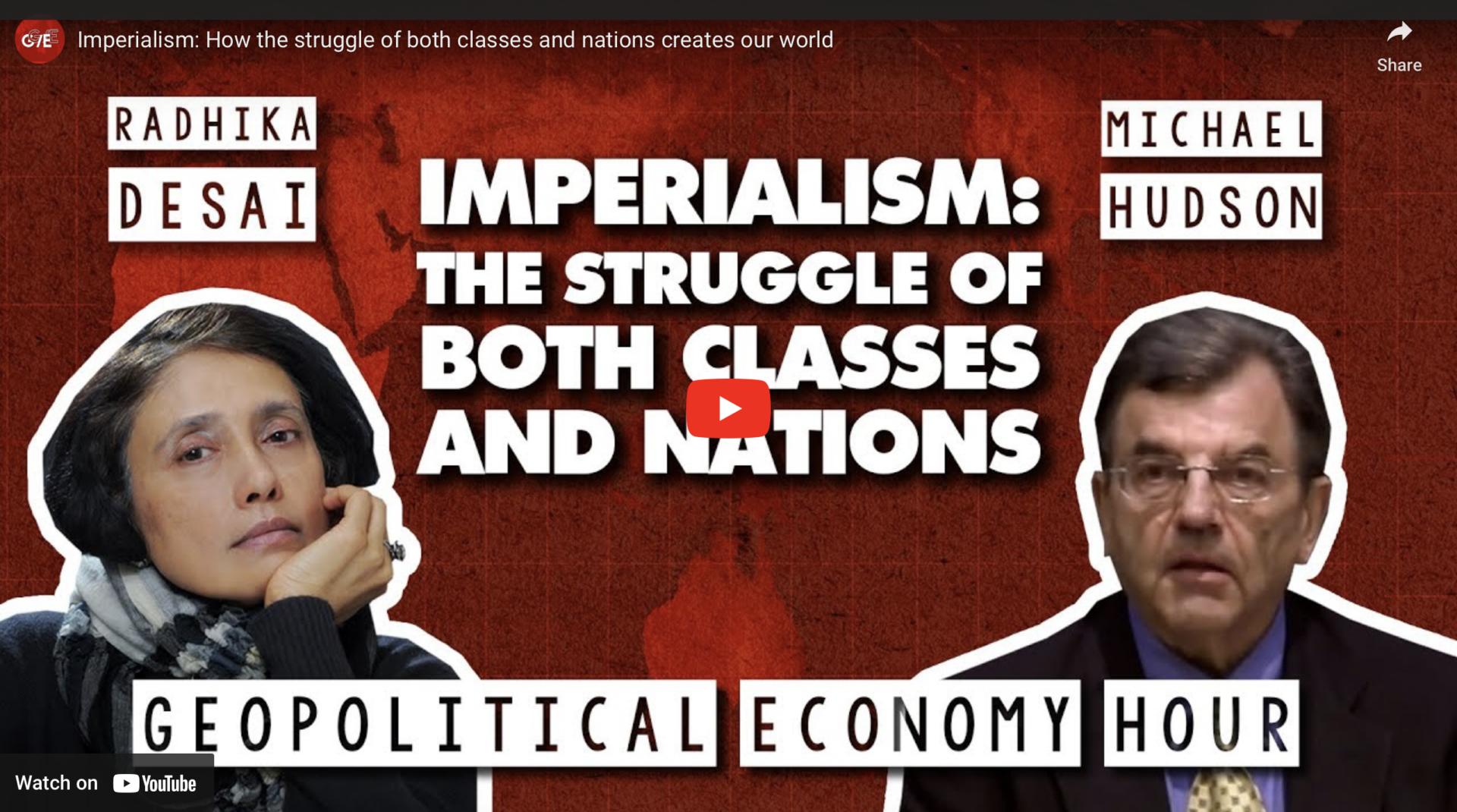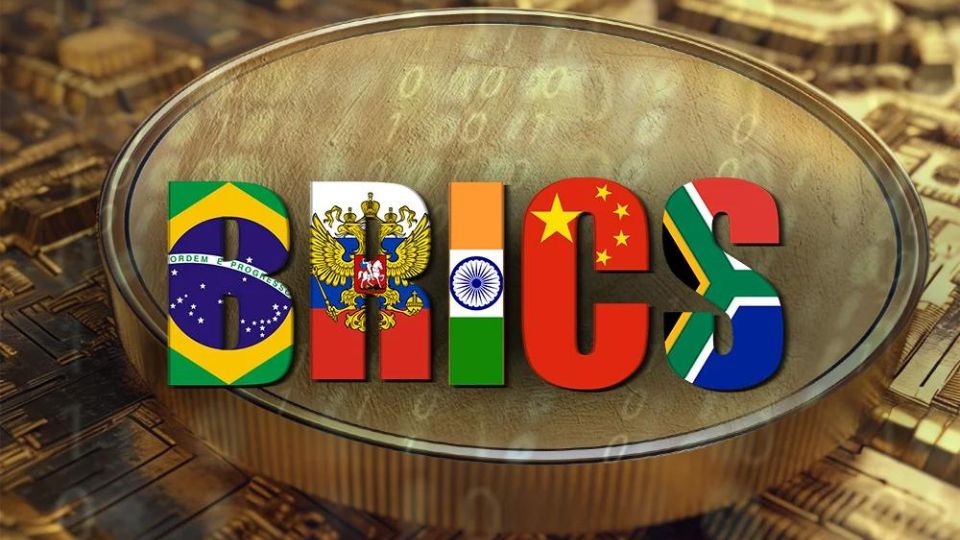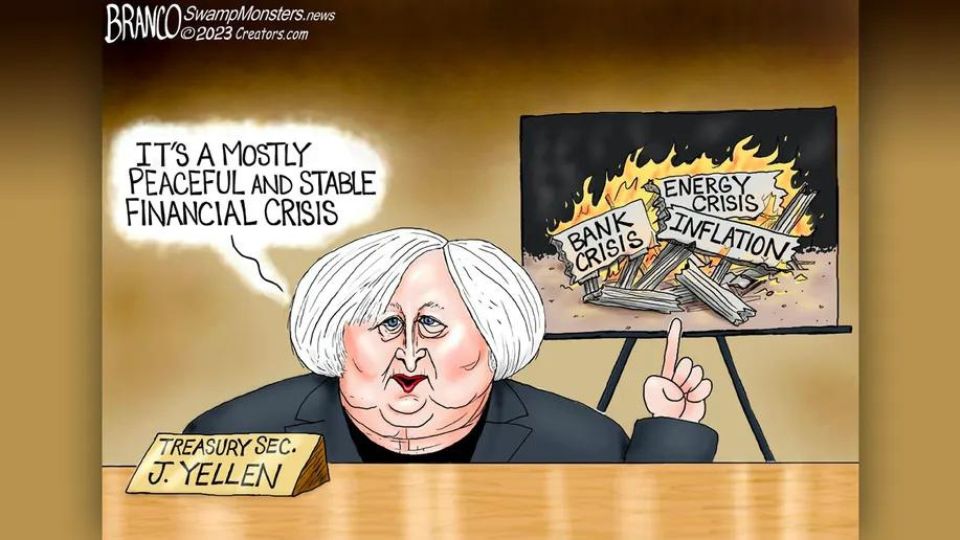BRICS+11 is what will end this self-destructive path for humanity.
… quoted…
“And what nobody really anticipated so clearly was that there has been an internationalism, but it’s been a unipolar internationalism that is leading to war, is the United States has basically declared war on the whole rest of the world with 800 military bases, interfering with one country after another.
And it’s been waging war almost the entire time since 1945, or at least since 1950, maybe a few years it hasn’t been at war. So the fact is that today’s internationalism and globalization is a war economy.
And the military spending by the United States has forced other countries to divert a lot of their economic surplus and government revenue towards military defense, instead of putting in place the infrastructure that they’d all been expected to do after World War II.
And they’ve also become very dependent on trade in oil, in food, monopolized technology, computer chips, pharmaceuticals that are controlled by the United States as an economic weapon to replace the overt military colonialism of Europe with a financial and international investment colonialism, all that’s backed by an enormous amount of military spending.
So normally we would say that what’s happened in the world is reflecting national self-interest. And that’s what everybody expected after World War II. They thought that, well, economic self-interest is going to determine the shape of the world.
But what American neocons imagine is a policy that serves their self-interest turns out to have led to de-industrializing the United States economy.
Because the US self-interest is to reduce its living standards, to cut back wage levels, to polarize the economy, and to define America’s self-interest as transferring as much money as possible into the wealthiest 10%.
Michael Hudson
THE GLOBAL CLASS WAR
Not only is the Western world essentially a war economy as mentioned above, but that has meant that US-centered imperialism has created a global class war as well.
Michael Hudson explains this phenomenon as well:
“And the result is that there was a polarization of the economy. I describe all of this in my book, Trade Development and Foreign Debt, which is a history of basically not only free trade theory but how it was controverted again and again by British, German and American economists.
All of that is now expurgated from the classical curriculum.
And the real result of free trade is when countries are forced into a trade deficit, their currency is going to decline and then they have to go to the International Monetary Fund that comes in and it imposes austerity and specifically anti-labor policies.
The IMF’s role is to aim at what Bill Clinton aimed at when he invited China into the World Trade Organization.
You want to keep a pool of labor, what Marx called the reserve army of the unemployed, not in the United States, but in the non-industrialized countries that basically are kept devaluing the price of labor throughout the world.
And that turns the phenomenon of U.S. centered imperialism into a global class war.”
Michael Hudson\
THE NATO WAR AGAINST RUSSIA AND CHINA
It’s all about what policies countries can take to liberate their economies and their governments from the U.S. attack.
… quoted…
“The U.S. called any government protection interference, as if the United States does not interfere.
Any defence is called interference and a distortion of the market, as if the market is set by U.S. central planners on Wall Street and in the State Department to create a world in which the United States will suck all of the surplus from the rest of the world into its own economy, as if this is natural.
And if you recognize that the essence of this unipolar U.S. strategy is finance, that that’s not necessarily military. Obviously, they’re going to grab the oil of Syria, grab illegally the oil of Iraq. But it’s by finance that they can operate much without the military overhead.
Well, then this is why we focused on de-dollarization and what that means in practice, starting with the most obvious policy, simply avoiding the use of the dollar and pricing trade in their own currencies, making swaps.
The question is, how are they going to go on to the next stage? That’s really going to be how it involves restructuring their domestic economy as well as the international economy.”
Michael Hudson
HOW WARSHINGTON OPERATES ON THE GLOBAL STAGE
Michael points this out in his usual brilliant fashion:
“The United States government is the world’s largest debtor, and it says, we’re the unique nation. We’re the only country that does not have to pay our foreign debt. And in fact, there’s no way that the government foreign debt, which means the bank reserves of the whole rest of the world that are kept in dollars, none of this can be repaid.
It’s just they can trade it with each other, but they’re never supposed to ask to be repaid. Only the U.S. private sector and the U.S. government can ask other countries to repay their debt.
That is the internal contradiction that has driven the world economy apart and is splitting it and is forcing other countries to either face a permanent sort of neo-feudal dependency on the United States or to say, well, we get to develop, too. It’s not going to be just the monopoly of the European garden keeping our jungle as a jungle.
So I think the basic point that we’re making is that the global majority needs public investment in infrastructure. It needs to modernize the economy and it needs to create prosperity.
And that means freeing their economies from U.S. dollar debt. It’s bad debt in the sense that it can only be repaid by siphoning off their economic surplus, by forcing them into bankruptcy financially and by stifling their growth.
That’s the contradiction, that the European garden can grow and the jungle cannot grow because any growth that it has is going to take the form of paying debt service to holders of U.S. dollar bonds, including their own domestic oligarchy.”
Michael Hudson
FINANCE CAPITALISM (THE WESTERN MODEL) IS PRIMARILY EXTRACTIVE
“It has loaded the economy down with debt so much by debt-financed housing, by making its labor have to earn a high enough wage to pay its housing debt, its education debt, its automobile debt, its credit card debt, that it’s unemployable.
So, of course, there are no investment opportunities left in the United States and Western Europe. That’s why the garden is deindustrializing and is going to turn into a jungle, because the only way that you can make money is financially by asset stripping, by deindustrializing your economy, by cannibalizing it.
And that’s the clearest in the U.S. and British economies. That’s what Thatcherism and Reaganomics is all about.”
Michael Hudson
WESTERN IMPERIALISM = THE ROMAN EMPIRE REVISITED
“It created great wealth for the wealthiest 1% or the 10%, but it impoverished the 90%. And if you’re going to impoverish the market, then you’re going to have the kind of crisis that Marx described.
And yet Marx did not think, see that it would, nobody anticipated that it would be a financial crisis because Marx hoped that industrial capitalism’s self-interest would lead it to prevent finance from operating the way it used to, by what he called usury capital, and actually become productive.
The Western economies since World War I have erased the whole distinction between productive and unproductive investment, productive and unproductive labor.
The GDP and national income accounts don’t draw any distinction between production and what is really a transfer payment to the rentier sector, to the finance, insurance, and real estate sector, or to monopolies.”
Michael Hudson
THE SELF-EVISCERATION OF THE US ECONOMY
And why BRICS+11 is the only solution…
“Well, I think what we’ve been describing is that U.S. imperialism has backfired to destroy its own economy. And above all, by de-industrializing and de-unionizing the labor force, by focusing on external exploitation of what America can get from other countries.
Instead of creating an economic surplus at home and within, the United States has followed the same kind of self-destructive dynamic that destroyed the Roman Empire.
It cannot re-industrialize, leaving the debt overhead in place any more than the BRICS countries can industrialize without freeing themselves from their foreign debt overhead.”
Michael Hudson
“Well, that seems to be what’s happening in the U.S. economy now. The wealthiest 1% to 10% are making so much money that it exceeds the deprivation and the indebtedness and the reduction and shrinkage of the 99% economy.
And so the only hope that the United States has of maintaining this kind of prosperity for the wealthiest financial class is to freeze the status quo, to block any kind of active government policies that promote labor and industry at home or abroad.
And the industrial capitalism today is a dinosaur. It’s what was leading the late 19th century onwards to what seemed to be socialism. But instead, we’ve got finance capitalism.”
Michael Hudson




